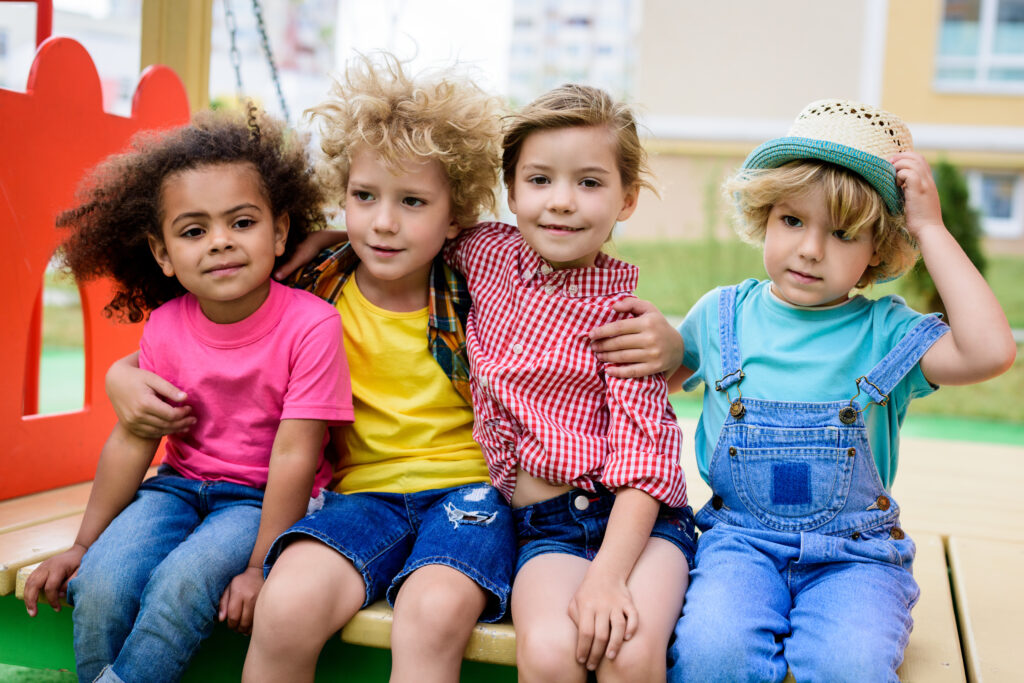In the fascinating path of becoming a parent, seeing our children’s brains develop is like seeing a flower open its delicate petals. Every step, every big achievement, shows what amazing potential those little minds hold. But as parents, what can we do to best help and encourage this brain development? Let’s go on a journey through the stages of cognitive development in children based on scientific data and find ways to help their minds grow.
The Bases of Cognitive Development
Children want to understand the world from the moment they are born. There are different stages in their cognitive growth, each building on the one before it. These stages are affected by many things, such as genetics, environment, and experiences.

Stage 1: Sensorimotor (from birth to age 2)
Babies learn about the world around them through their senses and movements during the sensorimotor stage. Every action they take, from picking up things to saying their first words, helps them learn about cause and effect. As parents, it’s very important that we create a stimulating setting and pay close attention to our babies’ cues. Games like peek-a-boo help them learn about social interaction and object permanence, which are important for their cognitive growth.
Stage 2: Preoperational (2 to 7 years)
Children start to use words and think in terms of symbols in the preoperational stage. When they pretend to play and tell stories, their imaginations are endless. As parents, we can help them be creative by letting them use their creativity and giving them chances to explore in any way they want. Talking, reading, and doing different things with them all help them learn new things and improve their speaking skills.
Stage 3: Concrete Operational (7 to 11 Years)
Kids’ thinking gets more organised and logical as they move on to the real operational stage. They can understand the ideas of conservation and reversibility, which helps them think mathematically and solve problems. Parents can help their kids’ brains grow during this time by giving them puzzles, board games, and STEM projects that they can do with their hands. Encouraging them to explain their thinking and look for ways their information can be used in the real world helps them understand things better and think critically.
Stage 4: Formal Operational (After 11 Years)
Teenagers learn to think about things in an abstract and hypothetical way during the formal operating stage. They can think about big thoughts, make plans for the future, and see things from different points of view. Parents can help their kids’ brain growth by teaching them to think for themselves, making them love learning, and giving them chances to explore and find out more about themselves. Having deep conversations with them, showing them different points of view, and encouraging them to follow their hobbies will help them grow into confident, curious people.
Why It’s Important for Parents to Know This Information
Parents need to know about their children’s cognitive development stages because it gives them a lot of information about how their child’s mind and actions are changing. With this information, parents can make sure that the way they interact with and do things with the kid helps their brain grow in the best way possible. By understanding how important each stage is, parents can see growth chances, prepare for challenges, and give their kids the support and guidance they need.
Valuable Information
The Role of Early Experiences in Brain Development
Studies from the Centre on the Developing Child at Harvard University show that early events shape the way the brain grows and develops. When kids are young, having positive interactions and being in stimulating settings can have a big effect on their brain development. This sets them up for future learning and success.
The Importance of Relationships and Language Exposure
In the first few years of life, the brain grows and develops amazingly quickly, with nerve connections being made at an amazing rate. Healthy brain development starts with having good relationships with carers, being in places with lots of language, and having fun.
The Harvard Centre found that children who have caring, responsive adults in their lives have better cognitive skills, such as better language development, problem-solving, and self-regulation. On the other hand, kids who don’t have helpful relationships or who live in hard situations like poverty or neglect may have trouble learning or developing.
The Impact of Environment on Cognitive Development
Child Development Demystified also shows how genes and the surroundings work together to affect a child’s mental development. While a child’s genetics can affect their potential, their surroundings are much more important in making that potential come true. Having access to a good early childhood education, healthy food, and safe, interesting places to play can greatly improve brain development.
Long-Term Effects of Early Interventions
Longitudinal studies also show that early interventions have long-lasting effects on cognitive results. It has been shown that programmes that help kids and their families in many ways, like high-quality preschool education and parent education efforts, have long-lasting effects that include better health, academic success, and social and emotional skills.
Parents as Key Players in Cognitive Development
As parents, knowing the science behind how kids’ minds grow gives us the tools to make the best settings for them to reach their full potential. We can set our kids up for future success and happiness by focusing on good relationships, giving them enriching experiences, and encouraging a love of learning.
In the end, study findings show how important parents and other carers are in shaping a child’s cognitive development. We can help every child reach their full potential and build a better, more promising future by investing in their early childhood experiences and making sure they have helpful relationships.
Creating Interest and Sparking Potential
As a parent, knowing the subtleties of your child’s brain development stages is like conducting a beautiful melody. By using methods that have been shown to work and encouraging our kids’ natural interest, we can help them reach their full potential in the future. Let’s start this trip with open minds and hearts, helping our kids find their way through the amazing world of cognitive development.
Parents, remember that you play an important part in helping your child learn and grow. You have the power to spark their interest, spark their imagination, and set them on a path of lifelong learning and finding through love, patience, and purpose. Let’s help these young minds grow, because they hold the key to making the world a better place full of curiosity, creativity, and kindness.
Have fun being a parent, and may your trip be full of joy and wonder!
Visit our YouTube channel for pregnancy tips and support for expecting mothers.


123win44, huh? I was kinda skeptical at first, but it’s not bad! Fast payouts, which is a big deal for me. Give it a spin, maybe? 123win44
Yo! 0055betapp is where it’s at for a quick flutter. Easy to use, and I had a decent win last week. Check it out! 0055betapp
Checked out 8betgame and they’ve got a solid selection of games! Something for every taste, so you’re bound to find something you like. Give it a try! Choose your games! 8betgame
Getting connected to 1win can be a bit tricky sometimes. Used 1winconnexion and it worked a treat. Straight to the action, no messing about. Good stuff!